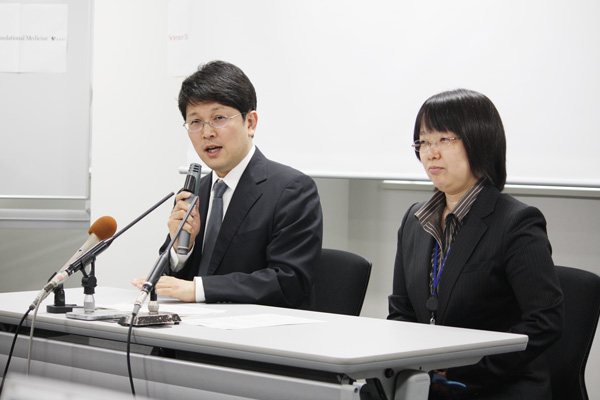
Research Activities
Research Activities
Publications
May 25, 2017
Cancer drugs for ALS therapy

Prof. Haruhisa Inoue (left) and Keiko Imamura
at press conference.
anti-cancer drugs have positive effects against ALS.
Professor and neurologist Haruhisa Inoue and his team at the Center for iPS Cell Research and Application (CiRA), Kyoto, Japan, have combined drug repositioning with induced pluripotent stem (iPS) cell technology to find a new candidate drug to combat amyotrophic lateral sclerosis (ALS). The study can be read in Science Translational Medicine.
Drug repositioning describes the use of a drug already approved to treat one disease for treatment on another. It is estimated that drug repositioning can cut the costs of drug discovery to one third, because it avoids exhaustive human tests that measure dosage levels and side effects.
ALS is a devastating disease that rapidly kills motor neurons. Patients normally live only a couple of years after diagnosis, and even the best drugs extend a lifetime just six months or so.
Moreover, ALS is a heterogeneous disease, meaning its cause is diverse. "Only 10% of ALS cases can be attributed to a genetic mutation," said Inoue, and even that 10% contains various mutant causes. This heterogeneity makes standard drug screening all the more difficult. Inoue therefore decided to conduct phenotypic screenings. "The one common phenotype in ALS is the death of motor neurons," he said.
iPS cells were made from the skin or blood cells of patients suffering from different causes of ALS. The lab then differentiated the iPS cells to motor neurons and conducted drug screenings. The screenings regularly found candidate drugs that targeted two particular enzymes. "Srk and c-Abl11 are enzymes that have been associated with various cancers," explains Inoue. "Several anti-cancer drugs inhibit their function."
"ALS motor neurons show an accumulation of protein misfolding. In healthy cells, proper autophagy would prevent the misfolding," he added. Treating the cells with one candidate drug, bosutinib, promoted autophagy and reduced the amount of misfolding. Tests in ALS mouse models showed that bosutinib could extend the lifetime of the mice, again by reducing the amount of protein misfolding. Bosutinib has been approved in multiple countries as an anti-cancer drug since 2013.
Drug repositioning not only offers a new way to treat diseases, it also provides new insights on the molecular mechanisms causing them. ALS is a poorly understood disease, which is one reason why effective treatments remain elusive. These findings give new targets to study how the disease develops. "Maybe inhibiting inhibitors of autophagy will improve outcomes," said Inoue.
Director of CiRA, Shinya Yamanaka, views these findings as another example of the power of iPS cell technology for medical innovation. "The combination of drug repositioning and patient iPS cells will significantly lower the cost of drug development. This will encourage more companies to invest in difficult diseases and bring new treatments to patients faster."
Paper Details
- Journal: Science Translational Medicine
- Title: The Src/c-Abl pathway is a potential therapeutic target in amyotrophic lateral sclerosis
- Authors: Keiko Imamura1, Yuishin Izumi2, Akira Watanabe1, Kayoko Tsukita1, Knut Woltjen1,3, Takuya Yamamoto1,4, Akitsu Hotta1,4,5, Takayuki Kondo1, Shiho Kitaoka1, Akira Ohta1, Akito Tanaka1, Dai Watanabe6, Mitsuya Morita7, Hiroshi Takuma8, Akira Tamaoka8, Tilo Kunath9, Selina Wray10, Hirokazu Furuya11, Takumi Era12, Kouki Makioka13, Koichi Okamoto14, Takao Fujisawa15, Hideki Nishitoh16, Kengo Homma15, Hidenori Ichijo15, Jean- Pierre Julien17, Nanako Obata18, Masato Hosokawa18, Haruhiko Akiyama18, Satoshi Kaneko19, Takashi Ayaki20, Hidefumi Ito21, Ryuji Kaji4, Ryosuke Takahashi20, Shinya Yamanaka1,22, and Haruhisa Inoue1
- Author Affiliations:
- Center for iPS Cell Research and Application (CiRA), Kyoto University, Kyoto Japan
- Department of Clinical Neuroscience, The University of Tokushima Graduate School, Tokushima, Japan
- Hakubi Center for Advanced Research, Kyoto University, Kyoto, Japan
- Institute for Integrated Cell-Material Sciences (iCeMS), Kyoto University, Kyoto, Japan
- PRESTO, JST, Saitama, Japan
- Department of Biological Sciences, Graduate School of Medicine, Kyoto University, Kyoto, Japan
- Division of Neurology, Department of Internal Medicine, Jichi Medical University, Shimotsuke, Japan
- Department of Neurology, Institute of Clinical Medicine, University of Tsukuba, Tsukuba, Japan
- MRC Centre for Regenerative Medicine, School of Biological Sciences, University of Edinburgh, Edinburgh, Scotland
- Department of Molecular Neuroscience, UCL Institute of Neurology, London, England
- Department of Neurology, Kochi Medical School, Kochi University, Japan
- Department of Cell Modulation, Institute of Molecular Embryology and Genetics, Kumamoto University, Kumamoto, Japan
- Department of Neurology, Gunma University Graduate School of Medicine, Maebashi, Japan
- Geriatrics Research Institute and Hospital, Maebashi, Japan
- Cell Signaling, Graduate School of Pharmaceutical Sciences, The University of Tokyo, Tokyo, Japan
- Department of Medical Sciences, University of Miyazaki, Japan
- Department of Psychiatry and Neurosciences, Research Centre of IUSMQ, Laval University, Laval, Canada
- Tokyo Metropolitan Institute of Medical Science, Tokyo, Japan
- Department of Neurology, Kansai Medical University, Hirakata, Japan
- Department of Neurology, Graduate School of Medicine, Kyoto University, Kyoto, Japan
- Department of Neurology, Wakayama Medical University, Wakayama, Japan
- Gladstone Institute of Cardiovascular Disease, San Francisco, CA






















